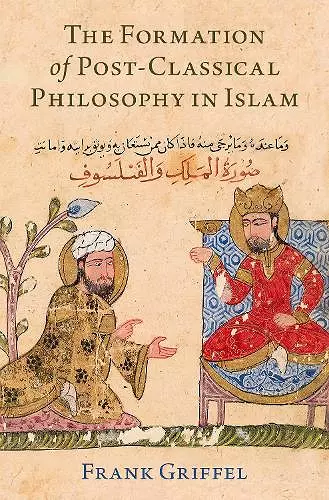The Formation of Post-Classical Philosophy in Islam
Format:Hardback
Publisher:Oxford University Press Inc
Published:7th Oct '21
Currently unavailable, and unfortunately no date known when it will be back

Scholars have come to recognize the importance of classical Islamic philosophy both in its own right and in its preservation of and engagement with Greek philosophical ideas. At the same time, the period immediately following the so-called classical era has been considered a sort of dark age, in which Islamic thought entered a long decline. In this monumental new work, Frank Griffel seeks to overturn this conventional wisdom, arguing that what he calls the "post-classical" period has been unjustly maligned and neglected by previous generations of scholars. The Formation of Post-Classical Philosophy in Islam is a comprehensive study of the far-reaching changes that led to a re-shaping of the philosophical discourse in Islam during the twelfth century. Earlier Western scholars thought that Islam's engagement with the tradition of Greek philosophy ended during that century. More recent analyses suggest that Islamic thinkers instead integrated Greek thought into the genre of rationalist Muslim theology (kalām). Griffel argues that even this new view misses a key point. In addition to the integration of Greek ideas into kalām, Muslim theologians picked up the discourse of classical philosophy in Islam (falsafa) and began to produce books in the tradition of Plato, Aristotle, and Avicenna—a new and oft-misunderstood genre they called "ḥikma"—in which they left aside theological concerns. They wrote in both genres, kalām and ḥikma, and the same writers argued for opposing teachings on the nature of God, the world's creation, and the afterlife depending on the genre in which they were writing. Griffel shows how careful attention to genre demonstrates both the coherence and ambiguity of this new philosophical approach. A work of extraordinary breadth and depth, The Formation of Post-Classical Philosophy in Islam offers a detailed, insightful history of philosophy in Iraq, Iran, and Central Asia during the twelfth century. It will be essential reading for anyone interested in the history of philosophy or the history of Islam.
It is certain that future research will greatly benefit from the painstaking effort at systematization Griffel undertook, as well as from the refreshing clarity and openness of his interpretations. * Marco Signori, Studi Medievali *
Without doubt, Griffel's extensive study is an inspiring and thought-provoking contribution to our understanding of the post-classical era. * Sultan Saluti, Revista Española de Filosofía Medieval *
Frank Griffel's The Formation of Post-Classical Philosophy in Islam is a must-read for anyone seeking to understand post-Avicennan philosophy in Islam. Through the study and contextualization of more than a dozen twelfth-century authors and in particular al-Rāzī's philosophical summae, this elegantly written, profoundly erudite book argues that the Islamic philosophy of the twelfth century "is no less philosophical than British empiricism or German idealism" and proposes a bold new assessment of the prevailing understanding of the relationship between philosophy and theology in the post-Avicennan period, both challenging and refining the cutting-edge debates on Islamicate intellectual history * Judith Pfeiffer, Alexander von Humboldt Professor for Islamic Studies, University of Bonn *
Islamic thought in the twelfth, thirteenth and later centuries is now a very exciting field, which is attracting many researchers. But Frank Griffel's contribution is outstanding. His magnificent new book on it is essential reading for anyone interested in the history of philosophy, because it both rewrites the standard account with its bold new thesis, and opens up the area to non-specialists * John Marenbon, Honorary Professor of Medieval Philosophy, University of Cambridge *
The post-classical period of philosophy in the Islamic world is still underappreciated but is receiving increasing attention from scholars. Griffel's important contribution to this endeavor is insightful in its treatment of major figures like Abū l-Barakāt al-Baghdādī and Fakhr al-Dīn al-Rāzī. More generally, he gives a compelling picture of the nature of "philosophy" in this period, showing great sensitivity to the methods and goals of the different kinds of writing that should be of interest to the historian of philosophy * Peter Adamson, Professor of Late Ancient and Arabic Philosophy, Ludwig Maximilian University, Munich *
The Formation of Post-Classical Philosophy in Islam is, first and foremost, a landmark contribution to that tradition...it also has much to benefit historians, philosophers, and anyone interested in the ways that problematic ideas in the present-such as narratives of decline-shape readings of the past. * Hasan Hameed, Marginalia Review *
The book is a masterful combination of the history of social-intellectual context (part 1), philosophical biography (part 2), and the history of philosophy (part 3), each meant to provide the most updated account of its subject matter...The book will deservedly become a go-to resource for Islamic intellectual history for a long time, and its various parts can conveniently be assigned for reading in undergraduate courses and graduate seminars. * Mehmet Emin Gulecyuz, University of Chicago, Journal of Religion *
The book is a masterful combination of the history of social-intellectual context (part 1), philosophical biography (part 2), and the history of philosophy (part 3), each meant to provide the most updated account of its subject matter... The book will deservedly become a go-to resource for Islamic intellectual history for a long time. * Mehmet Emin Gulecyuz, University of Chicago, The Journal of Religion *
Griffel has provided us with the most comprehensive exploration to date for the periodhe considers. It is a must-read for specialists, while also offering a valuable deep-dive for nonspecialists who seek a broader understanding of philosophy in the Islamic world. * Rosabel Ansari, Journal of the History of Philosophy *
- Winner of Winner, Sheikh Zayed Book Award, Arab Culture in Other Languages category.
ISBN: 9780190886325
Dimensions: 236mm x 167mm x 46mm
Weight: 1066g
664 pages